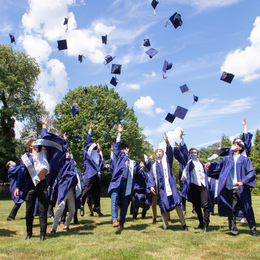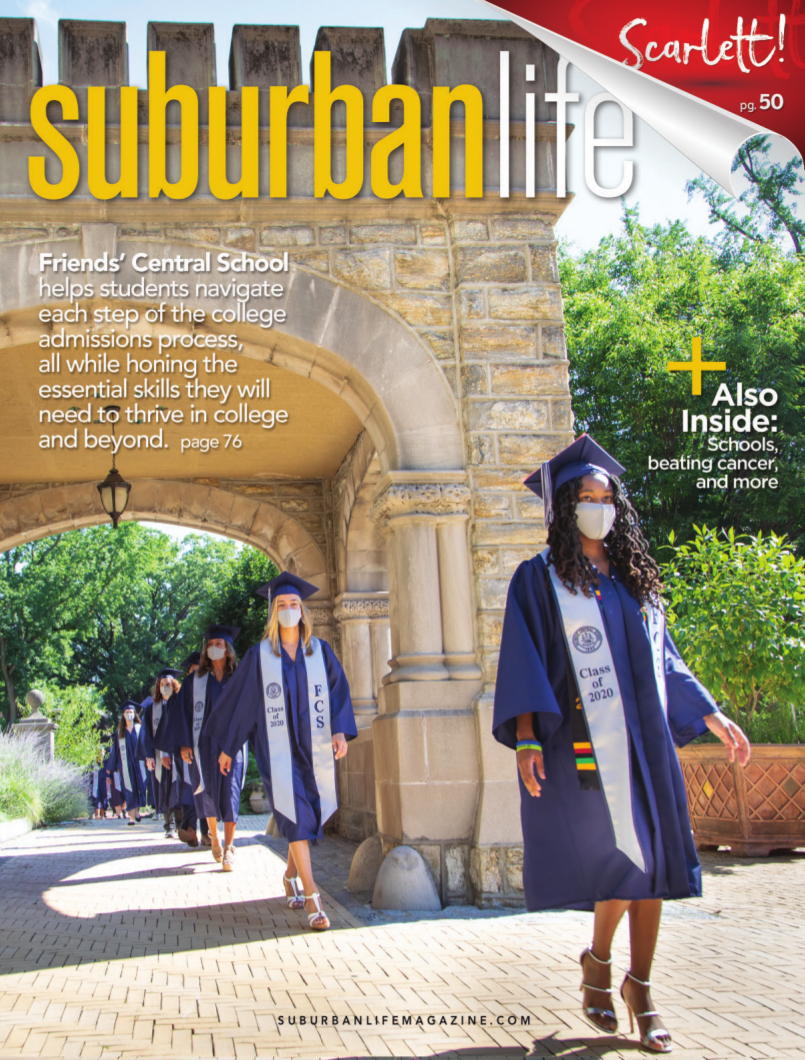
Higher Learning
Friends’ Central School helps students navigate each step of the college admissions process, all while honing the essential skills they will need to thrive in college and beyond.
“Where will I go to college? What do I need to do to get into the school of my choice? How will my family afford it?”
Such daunting questions have the potential to cast a pall over all four years of a student’s high school experience. At Friends’ Central School in Wynnewood, a devoted College Counseling Office works hand in hand with upper school students to answer these questions with confidence.
“We don’t have an agenda beyond being a resource for students as they move through the upper school and on to college,” says Director of College Counseling Grant Calder, who also teaches history in the upper school. “We want students to prepare for what’s next, but we also want them to focus on what they’re doing here at Friends’ Central School. We believe the more they do that, the bigger the payoff will be.”
While students go about finding their confidence, developing academic interests, and taking on leadership roles, the College Counseling Office guides them through each phase of the college admissions process. The first steps begin in ninth grade, when college counselors offer perspective on students’ course selections that will not only best serve their interests going forward but also help them follow their passions. The most intensive work occurs after the winter break of 11th grade and bleeds into the first half of 12th grade. During this period, students will complete standardized testing, obtain any necessary tutoring, complete college searches, and finish applications and essays.
Regardless of where a student falls on the timeline, Calder says “the door is always open” to address any questions or special concerns. In fact, he and his counterpart, Associate Director of College Counseling Andrea Pien, tend to assist students long after they graduate. An alumnus may “check in” seeking feedback on college classes, for example, or ask one of the counselors to pen a recommendation letter as part of an application to graduate school.
Calder considers it his duty to help students think more broadly about their options.
“Most students who want to go to medical school think they should major in biology, and most of them do,” Calder says. “But if I know a student has had significant experience in Spanish, I might say, ‘You’re a great Spanish student. Why not major in Spanish and knock out your pre-med classes?’ Having a second-language capacity in medicine today is a huge advantage. I might also suggest joining or even founding a club that corresponds to a particular area of interest. We’re here to help students make those kinds of connections.”
Calder suggests 98 percent of the school’s graduating seniors proceed directly to college, with the others taking a gap year before moving on to an institution of higher learning. Destinations include colleges and universities of every sort, from Ivy League schools, to local favorites such as Penn State, St. Joe’s, Temple, and Swarthmore, to the U.S. Air Force Academy, to specialized schools such as the NYU Tisch School of the Arts and the Colorado School of Mines, a public research university focused on science and engineering. (See sidebar.) For some, the best option may be the best-funded opportunity, enabling them to avoid a heavy debt burden for the future.
The counselors’ involvement does not stop at the counseling office door, according to Beth D. Johnson, upper school principal and assistant head of school for student life.
“Grant and Andrea are both deeply involved in the life of the school,” she says. “They see the student on stage in a play. They see the student performing in a debate. They go to games and stand on the sidelines. They know the students, and that has a huge effect on the work they’re doing.”
Noelle Mercer, a graduate from the class of 2017 who’s now studying theater at Yale University, remembers the College Counseling Office as a “supportive” resource that “kept me on track.” Her 2017 classmate, Elizabeth Kahn, says the office “helped me to start thinking about the college process in advance so that I would be prepared when the time came to apply.” She’s now studying neuroscience at Brown University.
Changes Ahead
Friends’ Central prides itself on being a college-preparatory school with a vigorous academic program, yet the school sees its responsibility as far more important than preparing students for college academics. The school strives to create independent thinkers with a deep-seated desire to make a difference.
“The education one receives here is of incredible value unto itself,” Johnson says. “When I think about what the world is like today, I know our students have been taught the skills to effect change in whatever field they choose. They have intellectual courage, the fearless attempt to continue learning and growing, but we give them moral courage as well. If we have done our part, working with families to produce students that will be upstanders rather than bystanders, we can be confident we will have released change agents into the world.”
She speaks from experience. In addition to having spent many years as a central figure in the school’s leadership, she’s a proud Friends’ Central alumna dating back to pre-K.
“Students like getting A’s here, but they’re concerned with more than just the outcome of a test,” she adds. “By the time students leave here, they know how to manage their own time, they know how to do good work without someone looking over their shoulder, they know how to collaborate, they know how to ask thoughtful questions, and they’re genuinely interested in what others have to say. A lot has changed since I was a student, but the heart and soul of the school have not changed.”
This may explain why colleges and universities take such an interest in Friends’ Central students. Calder tends to hear a common refrain among admissions officers from the more than 100 colleges that visit the campus in the course of a normal year: “I love your students. Not only are they interesting, but they’re not all the same.”
Colleges appreciate the fact that Friends’ Central students tend to replicate their success at the college level, as Calder has seen firsthand. His son and daughter, twins, graduated from Friends’ Central last year and have since enjoyed a smooth transition to college—one at Franklin & Marshall College, the other at Syracuse University.
“Nothing has shocked them in college,” he says. “They tend to be the ones who are leading discussions in their college classes. I’m sure they will eventually face challenges, as all students do, but they’ll get through whatever comes their way because they’re like all our students: They have been extremely well prepared.”
Friends’ Central School
Lower School Campus
228 Old Gulph Road
Wynnewood, Pa.
(610) 642-7575
Middle and Upper School Campus
1101 City Avenue
Wynnewood, Pa.
(610) 649-7440
Photography by Jay Gorodetzer courtesy of FCS
Published (and copyrighted) in Suburban Life magazine, October 2020



